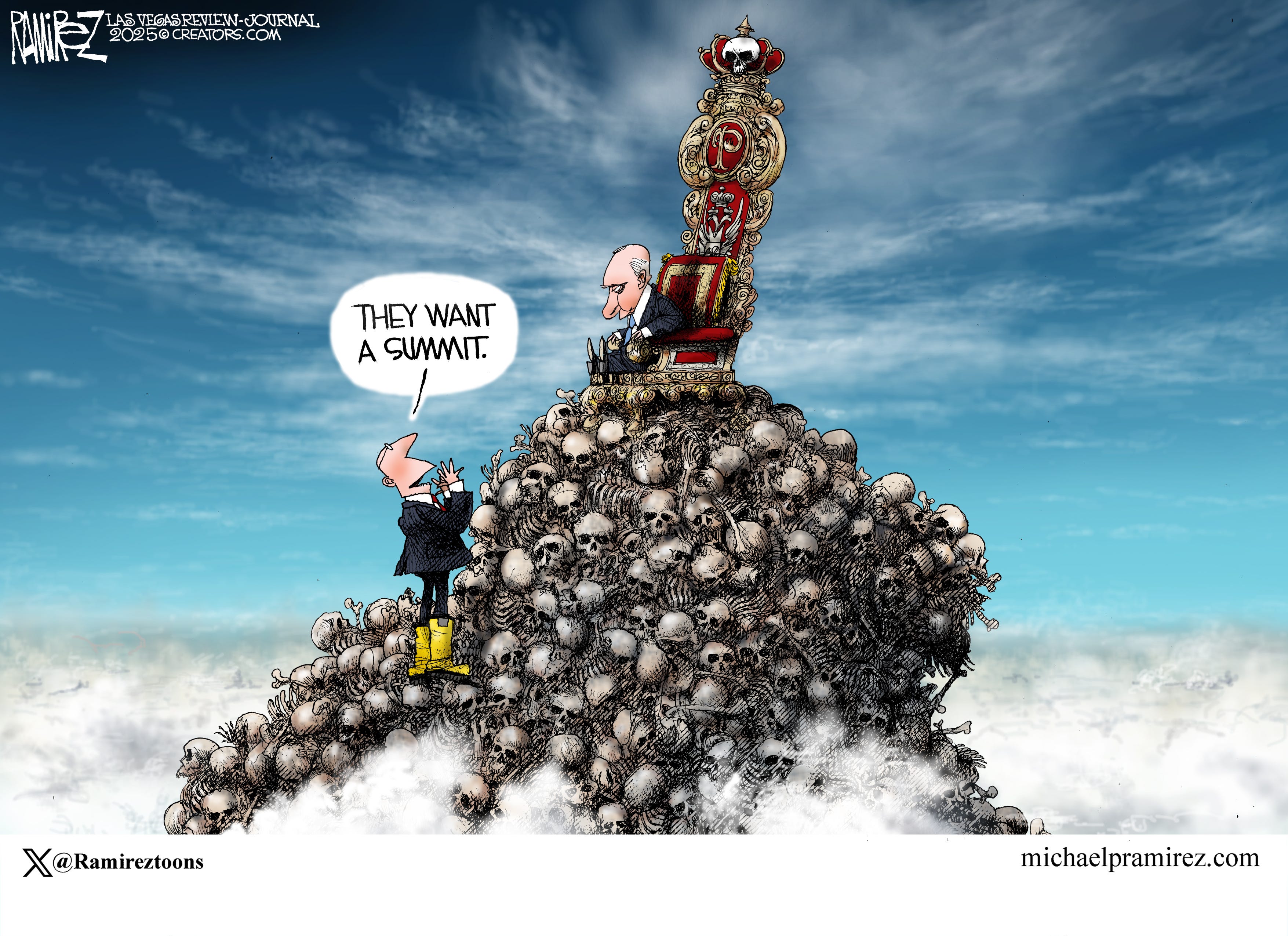Veronique de Rugy takes what should be a non-controversial stand: New Climate Report Deserves to Be Debated, Not Silenced
A new report from the Department of Energy concludes that, yes, the climate is changing and humans contribute to it — but no, it's not necessarily the impending catastrophe we've been warned about. In another era, an agency charting this kind of middle course would be unremarkable. Today, it feels revolutionary.
The debate over climate change and responses has become so polarized that acknowledging the problem of human-driven warming without accepting a narrative that can sound apocalyptic invites attacks from all sides. I understand that the findings are controversial and hope climate scientists debate every detail. Considering the upside of getting this issue right, you would think more people would encourage open debate.
That is exactly what led energy analyst Travis Fisher of the Cato Institute to return briefly to the administration and help organize the Climate Working Group, which generated the report. Like many of us who read from outside our ideological circles, Fisher was frustrated that many members of the left treat climate-crisis dissent as a thought crime, while many on the Right still dismiss climate change as a joke.
Some additional links:
- the report itself;
- the DOE press release;
- Travis Fisher's explanation: Why I Helped Organize the Department of Energy’s Climate Report;
- Roger Pielke's response to reporters' queries about the report.
I also liked Ted Nordhaus's explanation of his evolution on the issue: Why I Stopped Being a Climate Catastrophist.
Recently, in an exchange on X, my former colleague Tyler Norris observed that over the years, my views about climate risk have evolved substantially. Norris posted a screenshot of a page from the book Break Through, where Michael Shellenberger and I argued that if the world kept burning fossil fuels at current rates, catastrophe was virtually assured:
Over the next 50 years, if we continue to burn as much coal and oil as we’ve been burning, the heating of the earth will cause the sea levels to rise and the Amazon to collapse, and, according to scenarios commissioned by the Pentagon, will trigger a series of wars over the basic resources like food and water.
Norris is right. I no longer believe this hyperbole. Yes, the world will continue to warm as long as we keep burning fossil fuels. And sea levels will rise. About 9 inches over the last century, perhaps another 2 or 3 feet over the course of the rest of this century. But the rest of it? Not so much.
In case you're wondering, I'm sticking with my crackpot idea: Artificial Photosynthesis!
Also of note:
-
And the Tyrant of our Teapot Tempests. Jeff Maurer turns down his usual R-rated whimsiness to make a serious observation: Trump Is the Dictator of Our Dialogue.
You could pretty much write a “Trump did a bad thing” column every day. I try to dole them out sparingly because: 1) I think that comedians have the “Trump is bad” angle pretty well covered, and 2) If this blog becomes one-note, I would like that note to be “George Clooney’s The Midnight Sky was a self-indulgent pile of dinosaur shit.”
One of the most frustrating things about Trump is that he does more than just make shockingly bad decisions on the issues of the day; he decides what the issues of the day even are. None of us were talking about the Commissioner of the Bureau of Labor Statistics a month ago; that conversation started when a BLS employee committed the sin of competence, leading Trump to choose a replacement who is to economics what Gob Bluth is to magic. Nobody was talking about federal control of DC until Trump cooked up a policy in response to an imagined crime spike; if Fox News had aired Ferris Bueller's Day Off instead of their usual fare, Trump surely would have deployed troops to Chicago to crack down on delinquent teens. Reacting to the Trump outrage du jour engages Trump on a battlefield of his choosing.
But a universe of important issues are being ignored while Trump pursues a Fox-News-and-petty-revenge-fueled agenda. In the end, the most damaging impacts of his presidency might come not from issues he bungled, but from issues he simply ignored. Here are some issues that are non-entities in our dialogue while Trump feuds with the Smithsonian and seeks to build a Lavish, Grand, And Totally Heterosexual Ballroom at the White House.
Now Jeff, bless his heart, is what passes for a moderate liberal Democrat in this day and age. You and I might make some edits to his "issues" list, and we'd certainly disagree with his recommended "solutions".
And griping about the arcane complexity of the tax code? Please. That's an easy target, but Jimmy Carter called the tax code "a disgrace to the human race" fifty years ago. Like a number of things on the list, it's hardly Trump's fault that little progress has been made on that front.
But overall, Jeff's right: Trump has made it All About Him. We should do better.
-
And, oh, by the way… David Hebert notes a milestone. The National Debt Just Eclipsed $37 Trillion: Here’s What We Should Do About That. (NR gifted link)
Eliminating USAID was a good start, but this only saved $44.2 billion. The government would have to eliminate USAID 41 times to bring the budget back into balance. Other areas of cuts could include the Department of Education, the Department of Commerce, and the Department of Housing and Urban Development. There is no provision within the Constitution for the federal government to have a role in education or housing and urban development, and most of what Commerce does is cronyism. These departments have a total budget for this year of $585.8 billion.
To make real budgetary progress, though, the U.S. must tackle entitlement reform. In 2024, Social Security, Medicare, and Medicaid alone constituted 44 percent of all federal spending, or just under $3 trillion. The problem here is not that there are (supposedly) millions of people over 100 years old receiving Social Security payments. The federal government is not set up as an investment firm, capable of managing finances for millions of people, nor is it an insurance agency. These are promises that Washington bureaucrats have no business making and no ability to keep. The problem here is not that the government insufficiently funds these programs. For example, when health care is paid for by reaching into the pockets of other Americans, costs skyrocket.
David's got more good ideas, and if you need a free link, there's one up there.
-
The answer may surprise (and also depress) you! Scott Lincicome asks: How Much of Your Life (and Money) Have Dumb Rules Wasted?
Given the (ahem) tumultuous U.S. trade and economic situation and various personal obligations, I’ve been doing a lot of air travel this summer—a lot. While these trips have been physically and mentally taxing, they came with a silver lining: They’ve allowed me to conduct an informal field test of the effects of the July 8 change to the Transportation Security Administration requirement that most U.S. air travelers remove their shoes when transiting through airport security checkpoints nationwide. As anyone who has flown in the last two decades can attest, the simple “shoe rule” is highly annoying, but did it have a meaningful effect on wait times at airport security? The TSA seems to think so, with DHS Secretary Kristi Noem stating on the day of the announcement that the agency expects the rule change to “drastically decrease passenger wait times at our TSA checkpoints.”
And you know what? She’s probably right.
Scott does the math, and finds that over the nineteen years the shoe policy was in place, it's cost us tens of billions of dollars in lost time.
And yet, nobody's gone to jail.
-
Jeff Jacoby is cursed with a decent memory. Displayed by remembering a simple truth: When Israel left Gaza, everything got worse.
There is no way to know yet how this will turn out. But as Israel prepares to push still deeper into Gaza in what may be the cataclysmic final phase of its war to eliminate Hamas, it is worth looking back to reflect on another fateful, anguish-filled Israeli decision in Gaza — one that began the descent into the nightmare the Jewish state now faces.
It was exactly 20 years ago this week — Aug. 15, 2005 — that the Israeli government, led by then-prime minister Ariel Sharon, destroyed 21 Jewish communities in the Gaza Strip, evicting 9,000 Israelis and demolishing the homes where some of them had lived for decades. All of Gaza, denuded of its Jews, was then unilaterally surrendered to the Palestinian Authority. There was no quid pro quo. Israel relinquished the territory it had occupied in the 1967 Six Day War without requiring anything in return. Sharon labeled the operation "disengagement" — a term meant to suggest that by handing Gaza to the Palestinians, Israel could finally sever its ties to the troubled territory and its population.
What Israel got instead was, … well, you know.


![[Amazon Link]](/ps/asin_imgs/1668026317.jpg)
![[Amazon Link]](/ps/asin_imgs/B00P84HMKY.jpg)

![[Amazon Link]](/ps/asin_imgs/1594035849.jpg)





![[The Blogger]](/ps/images/barred.jpg)



